Biz New Orleans Recognizes New Orleans Ernest N. Morial Convention Center President and CEO with Top Honor
The New Orleans Ernest N. Morial Convention Center (NOENMCC) recently announced that Michael J. Sawaya, its President and CEO, has been honored as “CEO of the Year” by Biz New Orleans. The publication annually recognizes the 500 most influential leaders in the regional business community and from that list chooses the Executives of the Year.
Sawaya’s meticulous planning and execution have yielded significant economic benefits and growth prospects — both immediate and long term — for the NOENMCC and the New Orleans region. Since 2018, he pushed forward several major advancements, from advocating for the facility’s $557 million Capital Improvement Plan (CIP), prioritizing nationally recognized sustainability initiatives that lead to a LEED Gold certification, guiding the development of a new $1 billion mixed use development and opening up opportunities to small, emerging and disadvantage businesses.
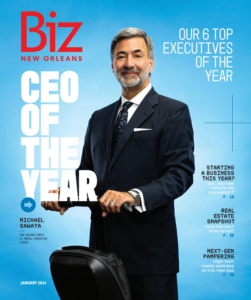 The CIP is critical to bringing the 1983-designed facility up to modern day standards and addressing critical infrastructure issues like replacing a 40-acre roof. Over $180 million of the $557 million CIP is complete or underway including the renovation of all the 140 meeting rooms, corridors and public spaces that also incorporate elements of New Orleans culture into the facility.
The CIP is critical to bringing the 1983-designed facility up to modern day standards and addressing critical infrastructure issues like replacing a 40-acre roof. Over $180 million of the $557 million CIP is complete or underway including the renovation of all the 140 meeting rooms, corridors and public spaces that also incorporate elements of New Orleans culture into the facility.
Beyond the NOENMCC’s internal achievements, the new riverfront neighbor, the River District, is beginning to take shape. Sawaya’s collaborative approach with the River District Neighborhood Investors, LLC (RDNI) helped to navigate the complex approval processes. Alongside elected officials and city representatives, RDNI and the Convention Center celebrated the beginning of critical infrastructure work with a groundbreaking ceremony on November 29, 2023. Once complete, the new River District will be a new neighborhood and hub of commerce and entertainment and be a transformative asset for the New Orleans region and the state of Louisiana.
“This recognition is a testament to Michael’s exceptional leadership, strategic vision and unwavering commitment to driving the Convention Center to new and greater successes which is critical to the economies of both New Orleans and the State of Louisiana,” said Jerry Reyes, President of the Ernest N. Morial New Orleans Exhibition Hall Authority, the governing board of the Convention Center. “He has been key in steering the Center through challenges like the COVID-19 pandemic and Hurricane Ida while shepherding our transformative $557 million improvement plan that will position New Orleans to be more competitive for years to come.”
With clear vision and passion, Sawaya is leading the NOENMCC into a bright future, with advance bookings now confirmed through 2040.
Christy Loy Named New Senior Vice President of Destination Sales for Meet Minneapolis
Meet Minneapolis recently named Christy Loy as the organization’s next Senior Vice President of Destination Sales. Currently the general manager of the Canopy by Hilton Minneapolis Mill District, she will replace Brent Foerster who is retiring from Meet Minneapolis after 10 years in the role. Loy will officially join the Meet Minneapolis team on Feb. 1.
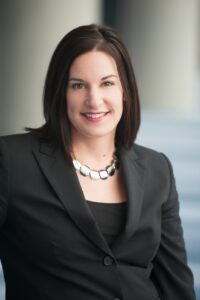
Christy Loy, Senior Vice President of Destination Sales for Meet Minneapolis
“Christy’s extensive background in the hospitality industry, particularly in hotel management and sales, aligns perfectly with the key responsibilities of this role,” said Meet Minneapolis President and CEO Melvin Tennant. “She will be instrumental in developing innovative sales strategies and expanding key relationships, ensuring that our tourism industry continues to thrive and grow.”
“As a local travel and hospitality leader, a city resident and a Minneapolis evangelist, I am intimately attuned to the critical role our destination sales efforts play in our tourism ecosystem,” stated Loy. “I am excited to contribute to the sales, development and strategic planning of Meet Minneapolis to drive revenue growth and expand market share by telling our bold and diverse story. For me, it’s a mission not a job.”
In addition to her current role at the Canopy by Hilton Minneapolis Mill District, Loy’s long tenure in the hotel industry includes past general manager roles with Minneapolis hotels such as W Minneapolis – The Foshay and Le Meridien Chambers. Prior to that, she served as the multi-site general manager for dual lifestyle hotel brands Aloft & Element Boston Seaport. In all, Loy has spent more than 20 years in the hotel industry.
Locally, Loy has deep connections with the tourism and hospitality community through roles leading the Greater Minneapolis Hotel Association and serving as the Secretary/Treasurer of the board of Meet Minneapolis.
“A national search firm was utilized, and a selection committee of current board members and key stakeholders viewed her hotel leadership experience and drive for building organizational culture and inclusion as significant factors in selecting Christy,” added Tennant. “Her passion and expertise align with our mission to drive economic and social prosperity for our city by attracting visitors, meetings, and events. I am excited to have Christy join an already stellar team.”
“I know experiences make memories. People do business with people they like. And Minneapolis is still an undiscovered treasure for many people in the world,” said Loy. “I look forward to working with the Meet Minneapolis team to bring even more meetings and events, large conventions and key sporting events to our city – and to be the destination of choice for tens of millions of travelers in the years to come.”
To allow for a seamless transition of this key leadership role, Foerster will continue with the organization through March 1.
New Name, Same Study for IAVM’s Leadership (formerly Graduate) Institute
Effective this year, what was IAVM’s Graduate Institute has been rebranded Leadership Institute (LI) and will open enrollment to experienced venue leaders, whether they attended Venue Management School (VMS) or did not.
Registration is now open to IAVM members for VMS and Leadership Institute, which will be held June 8-13 at Saddlebrook Resort in Tampa. Nonmembers can apply beginning Jan. 16.
Since the curriculum is all about leadership, and because it is of value to any IAVM member in a leadership role, the name change is simply logical, said Kim Bedier, CVE, SVP and GM, Honda Center/ocV!BE, Anaheim, CA, and Dean of IAVM’s Leadership Institute.
“It was never a graduate year that requires the prerequisite of VMS. You could go to VMS and never go to GI. The curriculum is different enough and has a different enough focus that, whether you’ve gone to those first two years or not, you still get a full experience and get a ton out of it,” Bedier said.
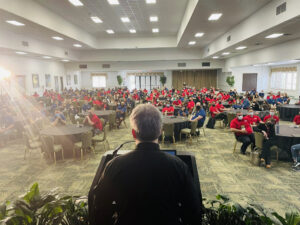
VMS 2022 students at the Opening Reception
Besides that, and “as we are want to do,” it seemed wise to do a little R&Ding (robbing and duplicating) from IAVM’s counterpart, Venue Management Australia (VMA), which named its comparable school Leadership Institute. Several VMS instructors, including Bedier, have taught there the last few years and saw the curriculum as about and for senior leaders who have experience and ideas to contribute while they learn.
While years one and two of VMS are about the basics of venue management, often for young and middle managers, and not usually for people who have been in the profession for a long time, Leadership Institute is for senior managers with at least five years of experience dealing with those skills being taught. “LI is for people who want to take the next step in leadership at venues,” Bedier said.
“We wanted to let IAVM members know, ‘if you are out there and you’re a more senior venue manager, you’ve been in this profession for awhile, and maybe you didn’t go to VMS, you should consider the Leadership Institute.’ It is somewhere they can interact with peers, learn more about themselves and enhance their ability to lead in venues.”
Applicants must be actively employed in the venue industry, working in a venue/working for a company that manages venues or working for an Allied company whose primary service provision is to venues. They must be an IAVM member (or sign up during the registration process), and be Senior Manager (a position that supervises others and has input into strategy) or above at their venue or company. CVE or CVP certification is preferred.
She also noted that LI is different from IAVM’s Senior Executive Symposium (SES), which is a two-year commitment (versus one for LI) and more general in its leadership skills (versus venue specific). A fairly common progression would be VMS, LI, SES, with several years in between to polish and develop the skills learned, Bedier has observed.
LI is never larger than 30 students and averages about 25, making for a very intensive week of getting to know your classmates and “solidifying professional and personal bonds like crazy,” Bedier said. It is a smaller class than either year of VMS and there are pre-class assignments, work that instructors later use in class. There is a lot of small group and partner study and students learn as much, possibly more, from fellow students as they do from the instructors facilitating the school, she said. Bedier has been teaching at VMS and LI for 20 years.
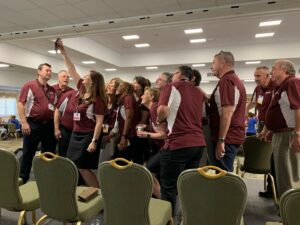
Faculty take time to commemorate another successful year of VMS with a selfie
Asked what he would say to encourage applicants to attend, Steve MacKenzie, CVE, Chief Innovation Officer, Momentus Technologies and an instructor at VMS/LI, replied: “I would go to one of our internal leaders who I felt would benefit from this program and tell them that this program is an opportunity to do a deep dive into subjects they need to know about being a leader in the venue world. There is no other educational offering available that will provide such specific learnings in this area AND that is delivered by experts who still work in this industry. They will come out of it with a massively better understanding of many topics that will make them a better leader, and they’ll build a network of extremely tight confidantes for life that they can rely on to discuss and bounce ideas off of.”
Those who have already attended Graduate Institute “could come back but they wouldn’t be very surprised,” Bedier added, since the curriculum has not changed. It is focused primarily on human resources. Both MacKenzie and Bedier see this as a one-time experience.
Attendance at two years of VMS, while not required, is still a legitimate enrollment qualification, she added. For those who have not attended VMS, five-plus years at a senior management level is required, “because that way you can contribute to topic discussions. If you haven’t managed at that level, you can’t really contribute.”
Nominations Now Open for Venue Excellence Award and Education & Service Award
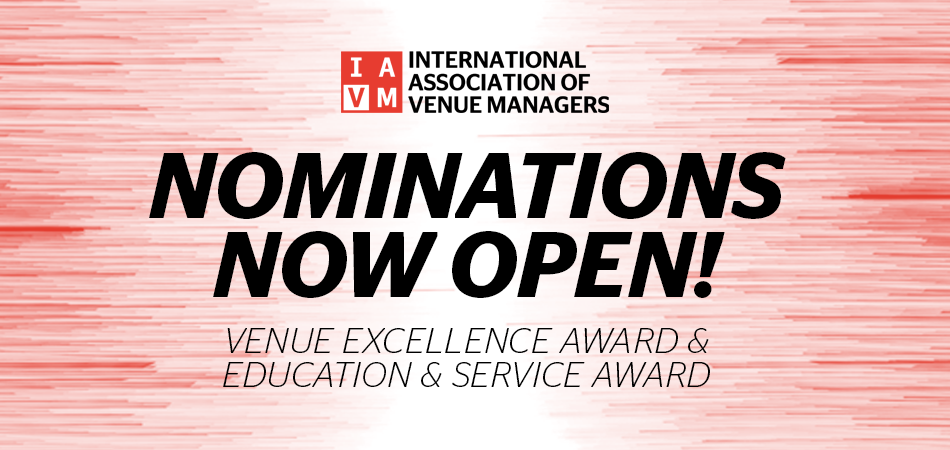
Applications are now open for the 2024 Education & Service and Venue Excellence Awards. These awards will be presented during VenueConnect in Portland, OR. The deadline to submit applications is March 29, 2024. The application process is extensive, and we encourage venues and organizations to create an “award team” to complete the application process as well as gather photos, etc. Detailed instructions are found within the application itself. We invite you to nominate an IAVM member or member venue that has exceeded expectations and risen above the rest.
The IAVM Education & Service Award recognizes member involvement through community outreach, education opportunities, mentorships, and internships that demonstrate excellence within our industry as well as giving back to the community. Some examples that have been shared include: active in high school programs and career development; offering internships for local college students within the company/venue; mentoring through community outreach or within a university setting; educational offerings to staff within the company/venue; community involvement with youth and young adults.
IAVM takes pride in its members that excel in providing their communities with an enjoyable space for all types of events and educational opportunities. Professional members, university faculty, allied companies as well as retired members are encouraged to apply. The IAVM Education & Service Award is given annually to no more than two companies/universities/venues and one individual who meets the criteria outlined below.
The Venue Excellence Award recognizes five IAVM venues of any type within the membership which demonstrate excellence in the management and operation of public assembly venues. This includes but is not limited to amphitheaters, arenas, auditoriums, complexes, convention centers, exhibit halls, fair/festival grounds, performing arts centers, racetracks, stadiums & university venues. IAVM takes pride in its members and member venues that excel in providing their communities with a safe and enjoyable space for all types of events and educational opportunities.
Any venue publicly or privately owned and operated, that has demonstrated excellence within the last calendar year and has at least one current employee who is an IAVM member in good standing may apply. Venues are eligible to win multiple VEAs; however, previous winners are eligible to apply in the third year following their most recent award. As an example, a venue that wins in 2024 may apply for the 2027 award.
Horvath, Longtime Volume Services Exec, Passes
Those who attended IAVM regional meetings in the 80s probably remember Gary Horvath as host of the Volume Services hospitality suite and ubiquitous card game.
Those who worked with him over the years recall his skill at concessions operations, and particularly, hiring the right people, people who had a heart for hospitality like he did.
Gary L. Horvath, 77, of Aiken, S.C., passed away on Sept. 7, with his wife of 48 years, Donna, by his side.
Concessionaire and minor league baseball team owner Ken Young first met Horvath in 1976. Both worked for Volume Services, Horvath at Dane County Coliseum in Madison and Young in Kansas City. “Our career paths were similar for the first 15 years,” Young said. They both became regional vice presidents, and soon enough, presidents, with Horvath in charge of the Western half of the U.S, Young the Eastern.

Tom Marchetto, with Aramark at the time, with Gary Horvath, Ovations Food Services, Bethel, Conn., at the IAVM trade show in 2000. (Photo courtesy of Amusement Business)
Horvath later left for Service America, and Young started his own business.
The business was different back then, not nearly as mature as it is now, not as much competition. “We joined Volume Services right before they stated their mercurial rise,” Young recalled. “We picked up account after account. Vince Pantuso headed up sales and marketing and Roger Jahnel operations.”
It was also a close-knit industry, everyone got to know each other and even when competing for accounts, “we were happy for each other. If you lost an account to some upstart, we’d think, he needs the business,” Young said.
A lot of people in that industry owe their careers to Horvath, who was “tremendous with employees, mentoring and hiring. He gave people opportunities.”
When Young started Ovations Food Services with Todd Wickner, and the company immediately signed up five baseball accounts, they turned to Horvath for help. He helped them kick off business, most particularly with the Zephyrs baseball team in Metairie, outside New Orleans. “Gary knew operations as well as anyone out there,” Young recalled.
Five years later, Horvath retired at an early age, 57, and moved his family to warmer weather in South Carolina.
He began his career in amusement park concessions, noted Chris Bigelow, The Bigelow Companies, also part of the old Volume Services gang. He started his career in Sandusky, Ohio, at Cedar Point, where he worked for Interstate United Corp. IUC eventually bought Volume Services in 1974.
“As Gary always said, he couldn’t have started any lower. He was a dishwasher in the employee cafeteria. He didn’t even interact with the guests,” Bigelow said. It was a humble start for a guy who’d played football in Youngstown State University and was a sergeant in the Army.
When Horvath was promoted and sent to Kansas City, Bigelow was already there, running concessions at the ballparks and Kemper Arena. “John Lamkin was our sales guy. We were all connected,” Bigelow said of the industry back in the day.
As best he could recall, John Dee got Service America going, and Horvath left Volume to become president of Service America. Larry Hatch and Barry Frielicher ran Volume. In 1985, Canteen bought Volume Services, followed by a merger between Volume Services and Service America, which became Volume Services America.
“It was one merger after another. The joke was, ‘if my new boss calls, get his name,’” Bigelow said of the players in that day.
Besides being a constant presence at IAVM region meetings for Volume Services, Horvath also served as president of the National Association of Concessionaires, Bigelow recalled. As did Pantuso and then Bigelow.

Gary Horvath with stadium manager Larry Staverman in 1995. (Photo courtesy of Amusement Business)
“One thing I remember, Vince always had us sponsor the women’s programs at the IAAM national,” Bigelow said. “He’d say, ‘if I get to know these people through the wives, they’ll ask their husbands, ‘how come we don’t have that wonderful Volume Services guy.’” Horvath was there. All the wonderful Volume Services guys were at those spectacular luncheons for the spouses and with their own spouses. Pantuso insisted his staff bring their own wives to IAVM, citing the number of hours they were already away from home because of the job. Therefore, Bigelow got to know Donna Horvath; Horvath got to know Marsha Bigelow, etc.
Volume Services and Kreuger Seating also hosted a major hospitality suite at IAVM. That, Bigelow remembered, was a lot of work. Horvath took his turn. It was definitely a different day.
“Everybody loved Gary,” Bigelow said, continuing his litany of people who did.
Horvath was born in Sandusky, Ohio on July 16, 1946. He attended Youngstown State University on a football scholarship and was drafted into the Army as soon as he graduated. He received orders twice for Vietnam, was sent back for further training and eventually ended up being deployed to serve in Korea on the DMZ as a Sergeant. He spent his career in the concessions industry running the food services for stadiums, arenas, and convention centers nationwide.
The Horvaths moved from Bethel, Conn., to Aiken, S.C. in 2005 to get out of the cold and into the warmth. Horvath enjoyed playing golf year round.
He was preceded in death by his parents Alex and Dorothy (Toni) Horvath and brother Tim Horvath. He is survived by his loving wife Donna, son Jason Horvath (Stefanie), granddaughter Charlotte Horvath, daughter Erica Gonzalez (Wilson) and sister Candy Clark.
Do you want to receive a Front Row News weekly digest?
Categories
- Allied (856)
- Architecture (147)
- Arenas (744)
- Career (890)
- Convention Centers (889)
- Education (608)
- Events (1,528)
- Food & Beverage (193)
- Foundation (113)
- Guest Experience (1,482)
- Industry News (2,253)
- Leadership (1,872)
- Marketing (150)
- Membership (1,985)
- Music (212)
- Performing Arts Centers (453)
- Professional Development (398)
- Research (127)
- Safety & Security (425)
- Sports (763)
- Stadiums (607)
- Student (159)
- Technology (515)
- Ticketing (92)
- Touring (82)
- Trends (357)
- Uncategorized (771)
- Universities (216)
- Video (25)
- Young Professional (198)
Twitter Feed
- Twitter feed loading
Recent Posts
- GEODIS Park Selects Allied Universal As Its Preferred Event Services Provider
- Venuworks Appoints Marc Solis as Executive Director of the Fresno Convention and Entertainment Center
- Los Angeles Convention Center Diverts 8,000 Pounds of Wood Waste to Local Foundation Supporting Fire Victims
- Fort Worth Unveils Plans for Phase 2 of Convention Center Transformation
- San Diego Convention Center CEO Announces Retirement After a Decade of Leadership
Categories
- Allied
- Architecture
- Arenas
- Career
- Convention Centers
- Education
- Events
- Food & Beverage
- Foundation
- Guest Experience
- Industry News
- Leadership
- Marketing
- Membership
- Music
- Performing Arts Centers
- Professional Development
- Research
- Safety & Security
- Sports
- Stadiums
- Student
- Technology
- Ticketing
- Touring
- Trends
- Uncategorized
- Universities
- Video
- Young Professional
Archives
- February 2026
- January 2026
- December 2025
- November 2025
- October 2025
- September 2025
- August 2025
- July 2025
- June 2025
- May 2025
- April 2025
- March 2025
- February 2025
- January 2025
- December 2024
- November 2024
- October 2024
- September 2024
- August 2024
- July 2024
- June 2024
- May 2024
- April 2024
- March 2024
- February 2024
- January 2024
- December 2023
- November 2023
- October 2023
- September 2023
- August 2023
- July 2023
- June 2023
- May 2023
- April 2023
- March 2023
- February 2023
- January 2023
- December 2022
- November 2022
- October 2022
- September 2022
- August 2022
- July 2022
- June 2022
- May 2022
- April 2022
- March 2022
- February 2022
- January 2022
- December 2021
- November 2021
- October 2021
- September 2021
- August 2021
- July 2021
- June 2021
- May 2021
- April 2021
- March 2021
- February 2021
- January 2021
- December 2020
- November 2020
- October 2020
- September 2020
- August 2020
- July 2020
- June 2020
- May 2020
- April 2020
- March 2020
- February 2020
- January 2020
- December 2019
- November 2019
- October 2019
- September 2019
- August 2019
- July 2019
- June 2019
- May 2019
- April 2019
- March 2019
- February 2019
- January 2019
- December 2018
- November 2018
- October 2018
- September 2018
- August 2018
- July 2018
- June 2018
- May 2018
- April 2018
- March 2018
- February 2018
- January 2018
- December 2017
- November 2017
- October 2017
- September 2017
- August 2017
- July 2017
- June 2017
- May 2017
- April 2017
- March 2017
- February 2017
- January 2017
- December 2016
- November 2016
- October 2016
- September 2016
- August 2016
- July 2016
- June 2016
- May 2016
- April 2016
- March 2016
- February 2016
- January 2016
- December 2015
- November 2015
- October 2015
- September 2015
- August 2015
- July 2015
- June 2015
- May 2015
- April 2015
- March 2015
- February 2015
- January 2015
- December 2014
- November 2014
- October 2014
- September 2014
- August 2014
- July 2014
- June 2014
- May 2014
- April 2014
- March 2014
- February 2014
- January 2014
- December 2013
- November 2013
- October 2013
- September 2013
- August 2013
- July 2013
- June 2013
- May 2013
- April 2013
- March 2013
- February 2013
- January 2013
- May 2012
- March 2012
- December 2011
- November 2011
- October 2011
Recent Comments
- Frank Bradshaw, Ph.D., CVE on John Meyer, CVE, a Tireless Advocate of Certification for Venue Professionals, Has Died
- Neil Sulkes on Hilary Hartung, Friend to Many in Venue Marketing, Has Left Us
- Jason Parker, CVE on The Devastation of Hurricane Helene and How We Can Support One Another
- Larry Perkins on Touhey Testifies Against Speculative Ticketing Before Congressional Subcommittee
- Peter Secord on Major Players for Planned Elkhart Amphitheater Were in the Mix at VenueConnect
